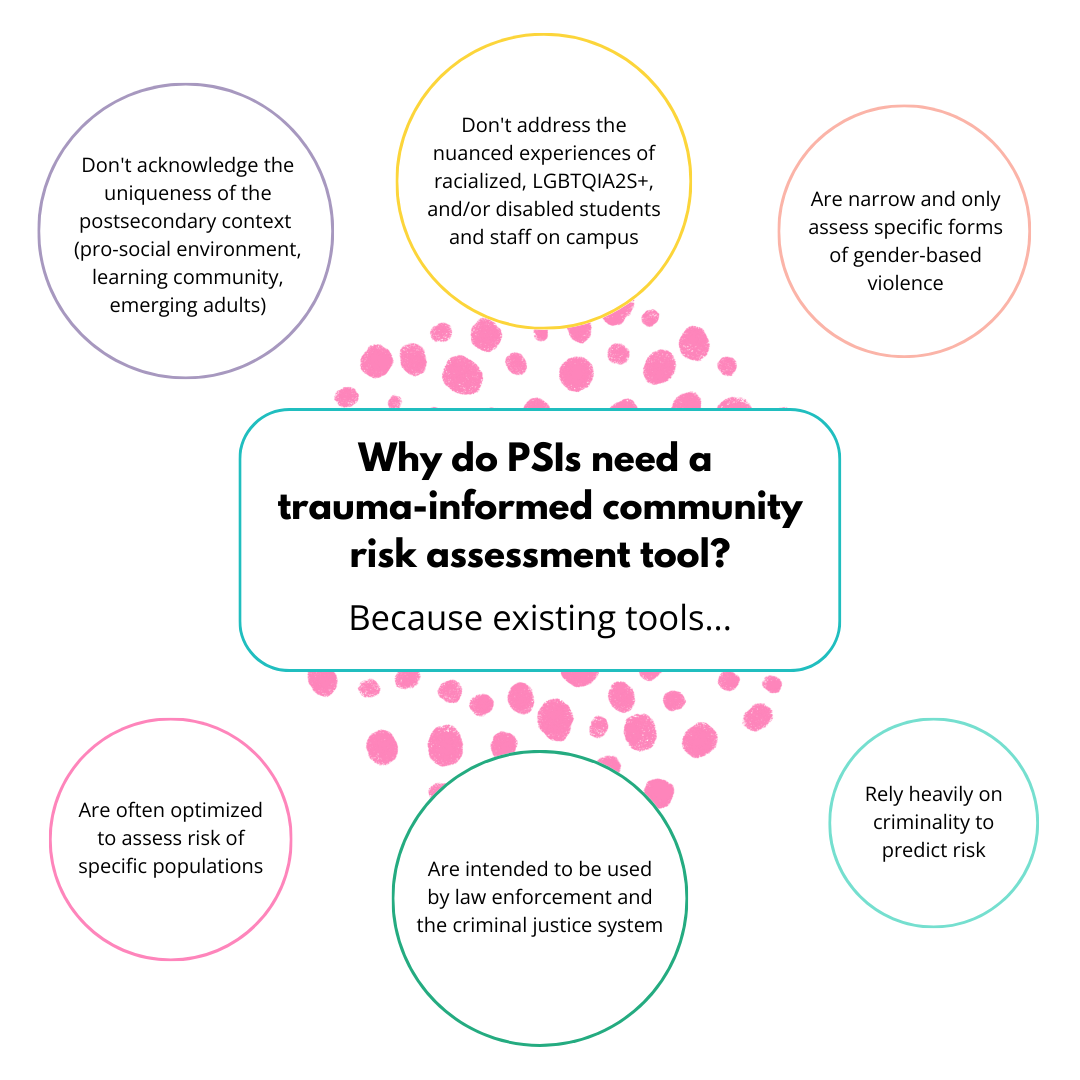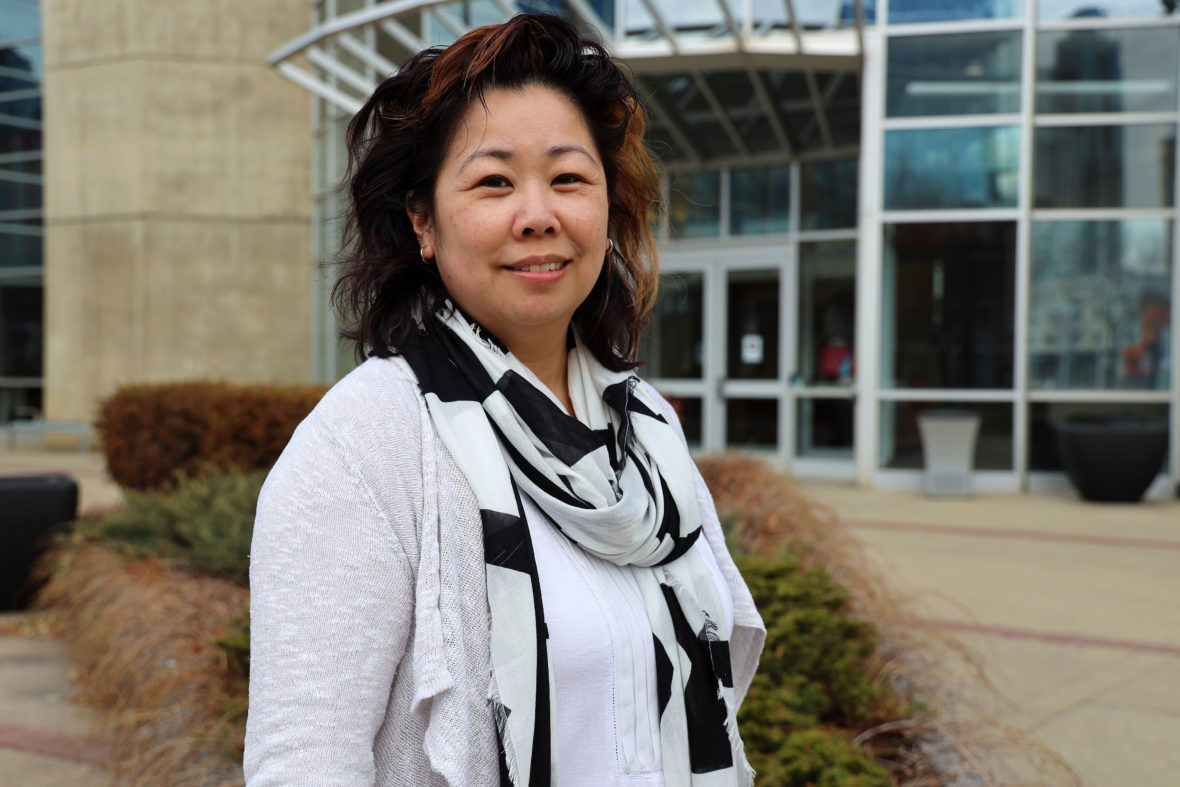An Update on the First Gender-Based Violence Community Risk Assessment Tool Designed for Campuses
Written by Dr. Sandy Jung and Dr. Jesmen Mendoza
We are so excited to be releasing the first Community Risk Assessment tool designed specifically for the post-secondary context on September 25th, 2023! Join us for the launch event by registering here.
As the Community Risk Assessment Team discussed in our last blog post, our goal was to develop a tool that would be more applicable and take a responsible approach to assessing GBV risk in the post-secondary context.
We took steps by conducting a comprehensive review of risk assessment tools, as well as thoroughly consulting the research literature on gender-based violence at post-secondary institutions. In developing this tool, there were many factors to consider.
First, to ensure it would be user-friendly and applicable in a post-secondary setting, we carefully considered the format. There are two types of risk assessment tools. The first are known as actuarial risk assessments: these use statistical modeling to identify items that will ultimately be included in the final risk assessment tool. The second type of risk assessments, structured professional judgements, are based on comprehensively reviewing the research literature from a particular theoretical standpoint where the empirically supported evidence suggests, along with the creators, which factors should be included. The difficulty with creating actuarial risk assessments is that large samples of data need to be nationally drawn from sources that are consistent, provide large samples and are obtained over a lengthy period of time. Gender-based violence advocates and students do not have the luxury of waiting for such a tool to be created along these lines. So, we adopted a structured professional judgment approach.
The second consideration was ensuring we had the ‘right’ risk factors. Through thorough review, we identified 22 risk factors grouped into four clusters. While some researchers might argue that this is enough to create a risk assessment tool, the drawback of a structured professional judgment approach is its sole reliance on the creators to distill the factors into its final form.
To broaden the viewpoints being considered, we had these 22 risk factors reviewed by various post-secondary stakeholders with expertise on gender-based violence that come from a unique perspective and location within the post-secondary community. Experts were drawn from across the country, from a variety of institutions. Two advisory panel groups were formed and were composed of sexual violence coordinators, student conduct officers, academic administrators, and most importantly, students. Panelists were asked to review the 22 risk factors, and we held consensus discussions over the span of 6 months that determined the 16 final factors, organized into four clusters.
On September 25th, we will be discussing these 16 factors that make up the Community Risk Assessment Tool and when this tool ought to be used during a student judicial affairs process! Join us to learn more about these factors and how they can help your post-secondary institutions make better decisions about responding to gender-based violence harm on our campuses.
Suggested Reference : Jung, S. and Mendoza, J. (2023, August). An Update on the First Gender-Based Violence Community Risk Assessment Tool Designed for Campuses. Courage to Act. www.couragetoact.ca/blog/cra-update
Dr. Sandy Jung (she/her)
Dr. Sandy Jung is a Professor in the Department of Psychology at MacEwan University on Treaty 6 territory, also known as Edmonton. Sandy maintains an active research program that focuses on the prevention of sexual assault, intimate partner violence, and risk assessment and management, and is funded by both internal and major external grants. She has numerous peer-reviewed publications in the field of forensic psychology, often co-authored with her students and several of her collaborators in law enforcement, forensic mental health, and other academic colleagues nationally and internationally. She regularly teaches abnormal, forensic, and clinical psychology, and actively provides supervision of honours and advanced research students. She has been awarded teaching and research awards by her institution and external academic associations. She serves on the editorial board for the journals, Sexual Abuse and Sexual Offending: Theory, Research, and Prevention.
Dr. Jesmen Mendoza (he/him)
Dr. Jesmen Mendoza has been registered with the College of Psychologists of Ontario since 2008. He’s provided counselling and psychotherapy services since 1999 on a range of issues, and in a variety of settings. He is located at Ryerson University, Centre for Student Development and Counselling where he provides therapy to university students, training to psychology practicum students and consultation to faculty and staff on tricky issues. Prior to Ryerson, he has provided services in a number of social service and criminal justice settings, and applies an integrated, inclusive and positive psychology approach to all of the clinical and community work he delivers.





